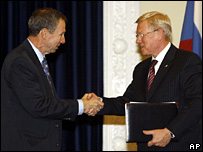 |
Sputnik's launch began the superpower space race
|
Ceremonies have been held in Russia to mark the 50th anniversary of the start of the space age - the launch of the first satellite, Sputnik.
Former Soviet cosmonauts, engineers and officials took part in several events recalling what is considered one of the most significant moments in history.
The launch was a propaganda coup for the Soviet Union during the Cold War and began the space race with the US.
After years of decline, Russia is back in the space game with ambitious plans.
'Historic event'
On Thursday, veterans of the Soviet space programme gathered at the Russian cosmonaut training centre, Star City, outside Moscow and to witness the unveiling of a monument to commemorate the launch of Sputnik in 1957.
Military officials also held a small ceremony near the Kremlin wall to lay flowers at the grave of Sergei Korolyov, who oversaw the project.
President Vladimir Putin sent a congratulatory message to Russian space scientists saying the launch of the world's first satellite was "a truly historic event, which started a space age".
The Sputnik satellite, weighing 83kg (183lb) and only twice the size of a football, could be seen with the naked eye as it circled the Earth for 22 days. It emitted a signal that could be heard on a household radio.
The BBC's Richard Galpin in Moscow says its launch was a giant leap for mankind and a propaganda coup for the Soviet Union in the midst of the Cold War.
As people around the world stared up in awe at the night sky to catch a glimpse of the tiny satellite, there was a realisation that something very fundamental had changed, our correspondent says.
Fifty years after Sputnik's launch, more than 800 satellites now orbit the Earth, used for communications, surveillance and navigation.
"I am convinced that the Sputnik accomplishment by the Russian people was responsible for the creation of the American space programme that I head today," said Michael Griffin, the head of the US space agency Nasa, at a ceremony at the Russian Academy of Science.
"Without Sputnik there would have been no Apollo," he added, referring to the US mission that put a man on the Moon in 1969.
"Indeed, when the space race of the 1960s was over, it may be said that we in America lost some of our own momentum."
Mars mission
After Sputnik there was a string of successes in space for the Soviet Union, driven by the intense rivalry with the United States.
These included sending the first man into space, Yuri Gagarin, and carrying out the first spacewalk.

Russia and the US have agreed to co-operate in space exploration
|
Now, after a long period of decline in the Russian space programme, the country's scientists and cosmonauts have finally secured a significant budget from the government, our correspondent says.
They have been given $12bn (£6bn) to spend over the next decade - a small amount compared with Nasa's budget, but enough for the Russians to have ambitious plans.
To coincide with the anniversary, it has also been announced that Russia and the US have agreed to co-operate in the exploration of the Moon and Mars.
Russia has agreed to provide equipment to search for water, vital if either are ever to sustain human life.
The Russians are particularly focused on Mars, our correspondent says. One expert told the BBC a manned mission could happen by the year 2020.
Bookmark with:
What are these?